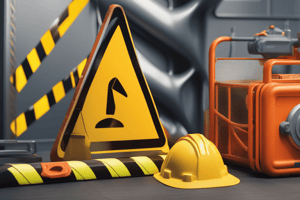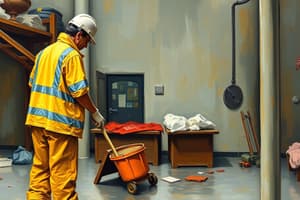Podcast
Questions and Answers
What is a characteristic of a physical hazard?
What is a characteristic of a physical hazard?
- A slippery floor (correct)
- Stress related to workload
- An unsafe workstation design
- Infection from bacteria
Which of the following is an example of a chronic hazard?
Which of the following is an example of a chronic hazard?
- Exposure to harmful chemicals
- Workplace bullying over time (correct)
- Electrocution from faulty wiring
- A fire in the office
What best describes an acute hazard?
What best describes an acute hazard?
- A poorly designed office layout
- A machine emitting harmful fumes over time
- An ongoing noise that causes stress
- A sudden spill resulting in a slip (correct)
Which option represents a chemical hazard?
Which option represents a chemical hazard?
How is risk defined in the context of hazards?
How is risk defined in the context of hazards?
What type of hazard could result from improper workstation design?
What type of hazard could result from improper workstation design?
Which of these hazards would be most likely to cause immediate harm?
Which of these hazards would be most likely to cause immediate harm?
Sodium hydroxide falls under which hazard category?
Sodium hydroxide falls under which hazard category?
Which term describes losses due to negligence that causes injury or property damage?
Which term describes losses due to negligence that causes injury or property damage?
What is the formula used to define risk quantitatively?
What is the formula used to define risk quantitatively?
Which of the following is NOT one of the basic elements of a health and safety program?
Which of the following is NOT one of the basic elements of a health and safety program?
What does personal risk specifically refer to?
What does personal risk specifically refer to?
Which term accurately describes the written document outlining processes for identifying hazards and preventing accidents?
Which term accurately describes the written document outlining processes for identifying hazards and preventing accidents?
Occupational safety and health is primarily concerned with which of the following?
Occupational safety and health is primarily concerned with which of the following?
What type of risk involves losses to property due to dangerous situations such as fire or theft?
What type of risk involves losses to property due to dangerous situations such as fire or theft?
What does occupational safety encompass?
What does occupational safety encompass?
Flashcards are hidden until you start studying
Study Notes
Definition of Hazard
- A hazard is anything that has the potential to cause harm.
Types of Hazards
- Physical Hazards: Include slippery floors, misused machinery, radiation, excessive noise, poor lighting, and fire.
- Chemical Hazards: Involve harmful substances like gases, dusts, fumes, vapors, and liquids.
- Ergonomic Hazards: Result from poorly designed equipment, risky workstation layouts, and repetitive movements.
- Psychological Hazards: Arise from shift work, workload pressures, harassment, discrimination, and constant noise.
- Biological Hazards: Include infections from bacteria, viruses, fungi, or parasites through various means such as cuts or insect bites.
Hazard Examples
- A moving lorry on a site represents a physical hazard as it poses a risk of running over a worker.
- Sodium hydroxide is a chemical hazard due to its corrosive nature.
- A damaged electrical code can lead to electric shock, highlighting a potential danger.
Characteristics of Hazards
- Some items are inherently hazardous, while others become so when misused.
- Accidents often result from negligence or disregarding hazardous situations.
Categories of Hazards
- Acute Hazards: Immediate and obvious risks, e.g., slippery floors.
- Chronic Hazards: Long-term impacts that may be less apparent, e.g., workplace bullying leading to stress.
Understanding Risk
- Risk is the likelihood of a hazard causing harm combined with the potential severity of that harm.
- Risks can be qualitatively categorized as high, medium, or low.
- Risk can be calculated using the formula: Risk = Likelihood x Consequences.
Types of Risks
- Personal Risk: Loss due to sickness, disability, or unemployment.
- Property Risk: Losses due to dangers, such as fire or theft.
- Liability Risk: Losses from negligence resulting in injury or property damage.
Basic Elements of a Health and Safety Program
- Management commitment and employee involvement are crucial.
- Worksite analysis and hazard prevention/control measures are necessary.
- Safety and health training must be implemented.
Importance of a Safety Plan
- A Safety Plan outlines processes for identifying hazards, preventing accidents, and responding to incidents.
- It may include method statements, job safety analyses, and project safety plans.
Occupational Safety and Health (OSH)
- OSH is a multidisciplinary field focused on ensuring safety, health, and welfare in workplace environments.
- It is essential for mitigating risks across various industries and protecting employees.
Studying That Suits You
Use AI to generate personalized quizzes and flashcards to suit your learning preferences.




